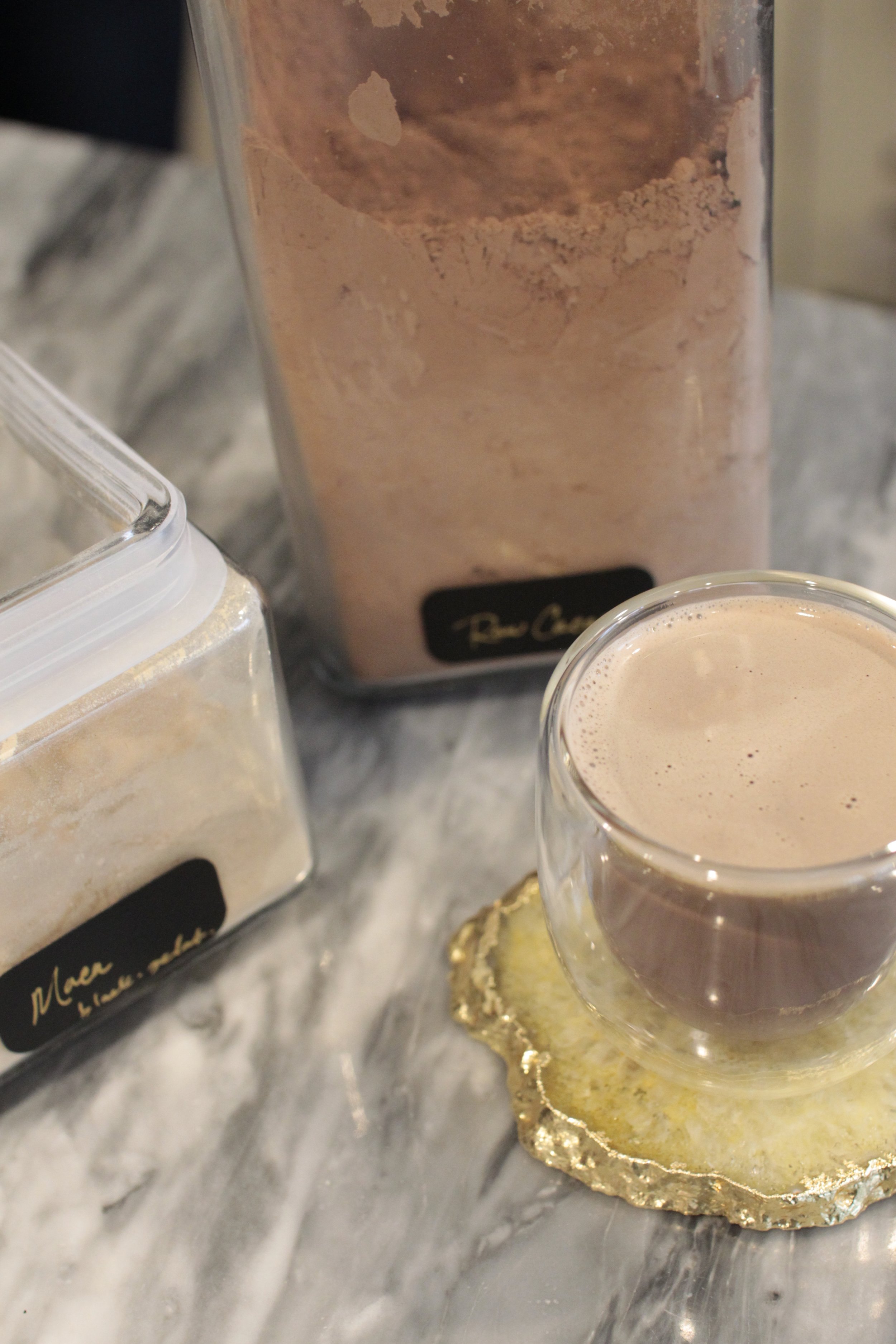What Is Maca Coffee? Benefits, Safety And Sources | Forbes
Article by Forbes:
Some herbal alternatives can enhance energy levels without the residual jitteriness some individuals experience after drinking a beverage containing caffeine, such as coffee or tea.
Research suggests that maca coffee, a caffeine-free herbal beverage made from powdered maca root, may help increase energy and stamina, as well as potentially support other body systems, such as reproductive and sexual health.
"Read on to learn more about how maca coffee is made, its potential health benefits and how to incorporate it safely into a daily wellness routine.
What Is Maca Coffee?
Maca coffee is an herbal beverage made from the adaptogenic herb lepidium meyenii, commonly known as maca. “Adaptogens are a category of herbs that increase a state of nonspecific resistance to stress and decrease sensitivity to certain stressors—essentially strengthening our stress-responses system. Only about a dozen herbs are considered true adaptogens”, says Rachelle Robinett, clinical herbalist and founder of New York-based Pharmakon Supernatural, a functional nature company that offers herbal education, herbal products and wellness consultations.
This caffeine-free drink is prepared by mixing powdered maca root or a powdered maca supplement with hot water. Other optional ingredients like milks, sweeteners or other herbs can also be used to help create a tasty energy-boosting coffee alternative. Research shows that the bioactive compounds found within maca, known as macamides, may be responsible for its potential anti-fatigue effects. Macamides are long-chain fatty acids, which are known to boost energy metabolism.
Robinett states that maca, the main ingredient in maca coffee, is a root vegetable native to the South American Andes Mountain region. “Maca has long been used as a functional food and supplemental ingredient, and recent studies show the herb may be beneficial for reproductive health,” she adds. However, additional research regarding potential health benefits of the herb is needed.
Maca is a versatile, nutritive and nourishing herb, says Kelsey Stang N.D., a naturopathic doctor based in Portland, Oregon who focuses on reproductive health and gastrointestinal concerns. “It benefits energy and hormone balance, and I love the ease of upgrading common foods or beverages, such as your hot morning beverage (coffee), to more intentionally support your body.” Maca can also be added into coffee if reducing caffeine intake isn’t an individual’s priority, according to Dr. Stang.
How Is Maca Coffee Made?
Maca coffee is most often made by combining powdered maca root and hot water, but other herbs and ingredients like cacao and cinnamon can be added to enhance flavor, says Dr. Stang. Many companies sell plain maca root powder while others offer pre-made maca coffee blends.
In addition to maca coffee, maca powder also blends well into recipes with room for a sweet, caramel-like flavor, such as baked goods or smoothies, says Robinett.
To make a basic cup of maca coffee:
Ingredients
1 cup of hot water, milk or a preferred alternative milk
1 tablespoon of maca powder
1/4 tablespoon of ground cinnamon (optional)
1 tablespoon of a sweetener of choice, such as honey or maple syrup (optional)
Instructions
Add all ingredients to a small saucepan, and heat on medium-low for about five minutes.
Whisk all ingredients until fully blended.
Meanwhile, Robinett suggests the following recipe enhanced with optional ingredients to focus on improving digestion/gut health, liver support, enhancing energy and stabilizing blood sugar.
Ingredients
2 to 4 teaspoons of maca powder
2 cups of water
1-inch piece of chaga or 2 teaspoons of chaga powder
1 tablespoon of either dandelion, chicory or burdock root powder, or 2 tablespoons of the aforementioned chopped and sifted dried herbs
1/2 teaspoons of cinnamon
1/2 teaspoon of cacao or carob (optional)
2 teaspoons of medium chain triglyceride (MCT) oil or coconut oil (optional)
Instructions
Put water into a pot
Add chaga, maca, dandelion root, cinnamon and cacao to water
Simmer for at least 15 minutes on medium-low heat
Strain out herbs (if using the cut and sifted variety)
Before drinking, feel free to add MCT or coconut oil
Divide into two, six-ounce servings (if sharing with a friend)
Drink as-is, or add milk or an alternative form of milk
Does Maca Coffee Contain Caffeine?
Maca coffee, made from the maca root, is known to provide sustained energy without the jittery effects of caffeine, helping individuals avoid caffeine-related anxiety or insomnia. “Maca doesn’t contain caffeine, but it can support energy through its dense nutrient content full of macamides and carbohydrates,” says Dr. Stang. Maca is also high in copper and manganese, as well as a good source of vitamin B1 and iron, she adds. Maca coffee may also have a positive effect on the adrenal glands, though further, high-quality human trials are required to confirm this potential benefit.
Potential Benefits of Maca Coffee
Maca coffee may offer a wide range of benefits in addition to its potential energy-enhancing qualities, but research in humans to support its purported benefits is sparse. Preliminary research suggests that ingesting maca, such as in the form of maca coffee, may enhance sexual desire, performance and satisfaction, as well as support fertility via improved sperm count and motility, says Robinett, but most existing studies to support these claims are done in animals. Maca is also often used to address symptoms of menopause (mood changes, hot flashes and night sweats and hormone imbalances) and support normal cortisol levels, she adds.
These purported health benefits of maca may not be attainable by consuming just one cup of maca coffee a day. “[Maca] is considered a food herb, which means that doses quite high are required for therapeutic or medicinal benefits—otherwise it’s eaten or mixed into other dishes and drinks as a nutrient-dense food,” says Robinett. “Given its status as a food-herb, it can/should be consumed in fairly high doses [to see] benefits, which means that multiple cups [of maca coffee] per day is generally fine or even advised,” she adds. However, not enough comprehensive research exists to determine a safe and effective dosage of maca coffee per day.
Maca coffee may have a potentially beneficial effect on hormone balance because of its interaction with the hypothalamus-pituitary-adrenal axis (HPA axis), the main stress response system within our body, says Dr. Stang. It may take six to eight weeks of drinking maca coffee to notice a difference in hormone balance, during which time a person may notice better digestion, increased energy and improved sleep, she adds.
While maca has been used in herbalism as a health-promoting ingredient for centuries, robust, human clinical trials supporting its purported benefits (and the benefits of maca coffee) are lacking.
Research suggests that replacing a caffeinated drink with a caffeine-free alternative like maca coffee may offer several health benefits, such as decreased anxiety, better sleep and healthier digestion.
Is Maca Coffee Safe?
While there’s limited research regarding maca coffee’s safety in humans, some maca users have reported side effects, such as altered menstrual cycles, moodiness, cramps, gastritis and insomnia.
Someone who is considering swapping their morning beverage for maca coffee should first consult a health care provider, especially if they are pregnant, breastfeeding, are taking additional supplements or medications, such as blood thinners, or have underlying medical issues like thyroid conditions. Hormone-sensitive groups, such as people who are pregnant, breastfeeding or have breast cancer or endometriosis, should also speak with their health care provider due to the herb’s potential hormone interactions and lack of research into its safety.
The U.S. Food and Drug Administration (FDA) has labeled some maca supplements unsafe, so it’s important to purchase maca coffee from reputable brands.
What to Look for in Maca Coffee
Maca powder, used to make maca coffee, can be made from different varieties of this plant such as red, yellow, or black maca, and can be processed in different ways, which all affect the nutritional and therapeutic benefits of the herb, according to a review published within the Journal Food and Function. This review also found that the cultivation and preparation of maca impacts its biological activities and levels of beneficial constituents.
Several companies sell powdered maca coffee products formulated with additional ingredients, such as cacao, cinnamon or other herbs. Alternatively, an individual could opt to purchase plain maca powder, which is widely available through myriad online retailers, and design their own maca coffee beverage.
Since herbs and supplements aren’t regulated by the Food and Drug Administration (FDA) or other quality assurance organizations, Dr. Stang recommends looking for products that are organic, free of additives, such as binders, artificial flavors or sweeteners, and ethically sourced.
”The purest form [of maca] is best,” says Dr. Stang. “This includes responsible sourcing from the plant’s origin habitat, the Peruvian Andes. Look for products that are minimally processed, non-GMO and from trusted, third-party tested companies.”


